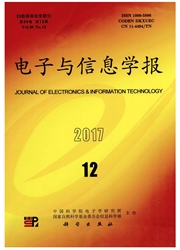

 中文摘要:
中文摘要:
同时同频全双工通信的射频域自干扰抑制量增加,导致数字域自干扰信号的信噪比下降,使得数字域自干扰抑制量减少。针对这一现实问题,该文分析了数字域自干扰抑制能力与射频域自干扰抑制量之间的量化关系,在典型数字域估计算法下,给出了具体关系的闭合解。分析与仿真结果表明,全双工通信在执行射频域联合数字域自干扰抑制时,射频域自干扰抑制的增大量总是大于数字域自干扰抑制能力的减小量,当射频域自干扰抑制较小时,数字域自干扰抑制将更有效;过大的射频域自干扰抑制量将造成数字域自干扰抑制性能的损失。
 英文摘要:
英文摘要:
The self-interference signal to noise ratio in digital domain decreases as the amount of RF self-interference cancellation increases in Co-time Co-frequency ~ll Duplex (CCFD) communications. The amount of digital self-interference cancellation decreases as the digital self-interference power decreases. The impact of the amount of RF self-interference cancellation on digital self-interference cancellation is analyzed. The digital self-interference cancellation is analyzed in this paper based on LS and MMSE channel estimation. It is shown that the decrease in the amount of digital self-interference cancellation is always less than the increase in RF self- interference cancellation when applying digital cancellation after RF cancellation in full duplex communications. Applying digital cancellation after RF cancellation is more useful when RF cancellation delivers poor suppression. The performance of 'digital self-interference cancellation will degrade when RF cancellation achieves large suppression.
 同期刊论文项目
同期刊论文项目
 同项目期刊论文
同项目期刊论文
 Performance Analysis for Distributed-Antenna OFDM Systems With Multiple CFOs Using Zero-Forcing Dete
Performance Analysis for Distributed-Antenna OFDM Systems With Multiple CFOs Using Zero-Forcing Dete Analysis of Carrier Utilization in Full-Duplex Cellular Networks by Dividing the Co-Channel Interfer
Analysis of Carrier Utilization in Full-Duplex Cellular Networks by Dividing the Co-Channel Interfer Effects of Array Orientations on Degrees of Freedom for 3D LoS Channels in Short-Range Communication
Effects of Array Orientations on Degrees of Freedom for 3D LoS Channels in Short-Range Communication 期刊信息
期刊信息
